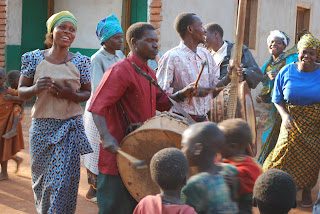The orphanage director we met said shyly, “The children ask me, ‘Why don’t you ask the rich people for money?’” She had gone through her city seeking help. She continued her explanation, “But that is not how it works. You cannot make them.”
Now hugging her heart she said, “They don’t understand.” I think she was referring to her children not understanding. She fears they will grow up full of anger. But maybe she was referring to the wealthy, maybe even to us, now standing before her.
But who can understand? Even a casual look revealed the scope of poverty to be beyond one’s resources or that of any accessible. The prophecy is at once confirmed, “The poor will always be with you.” And so one’s hand is pulled back as from a hot stove.

There is another way to look. Into the eyes.
And here is something different. Not the so-called ‘face of poverty’. Just a face.
We tell ourselves that the poor are somehow different. We are able to maintain that attitude by keeping them flat – in pictures on our TV and in junk-mail pleas. But when we see them face-to-face, our defenses are challenged.
Of course! They are people like us. They mourn their dead – but all too often. They are smart and industrious but under-educated and without resources. They feel pain and hunger; they rejoice and pray. They love but more freely. They are not two dimensional.
They are us. Why is this a revelation?
To look into the eyes is not ‘moving’. Rather, motion occurs naturally. Here in Africa there is often music and with it, joyful dancing. At first one stands at the edge like a nervous teenager at a school dance, only watching. Then your head starts nodding. Your hands start clapping. Without thought your feet are soon moving and you are joyfully dancing, too. That is what it is to look this other way – to look into the eyes.
And this is important: You stop giving and start sharing.
It is in the nature of dancing, naturally.
To say we were on a mission trip is a confusion of reality. It means we went to take care of them. Yet the most common statement made by people on such trips is that they got more out of it than they gave.
Yet that is still deceptive. This is not just a balance of trade between givers, with one delivering goods and the other spirit. No, it was literal and in every way. The words we used most by far were, “Asante sana”. Thank you very much. We said this constantly. The African’s were always giving. No, not that. They were sharing generously; even out of their deep need. We constantly felt a sharing that was joyful and energetic and caring and generous and what can be said? It defies description. It was so warm it would make us ache.
The other thing about dancing is that it is best done with partners and in a group. And that’s how it was. We were together in sharing. And so the energy of the dance was greater than the sum of the dancers. That’s how a good dance feels. The music unites the dancer’s energy and brings them to a place they cannot go alone.
feels. The music unites the dancer’s energy and brings them to a place they cannot go alone.
 feels. The music unites the dancer’s energy and brings them to a place they cannot go alone.
feels. The music unites the dancer’s energy and brings them to a place they cannot go alone.It was truly a spiritual experience. We came to know something we could not learn any other way. We sang new songs in new tongues. We danced new dances.
And we saw in a new way. We learned the meaning of some other words from that prophet, “Lord, when did we see you hungry and feed you or thirsty and give you something to drink?” It was both the unrighteous and the righteous who say these words. Neither recognizes the Lord in the needy, but one acts because they see their brother in need and so naturally they move. Not guilt. Not giving. Not apportioning. Sharing. We looked into their eyes and saw in a new way.
Our eyes were opened.
There once were two brothers. The older brother was wealthy and alone and the other poor, with many children. On the day of his death, their father divided the land evenly. That night, the older brother lay awake staring into the darkness. He said to himself, “This is not fair that our father divided the land evenly. My brother is poor and his family in need. So he is not shamed, I will rise early and move the property marker.”
The younger brother also lay awake with sadness. He said to himself, “Why should I receive this land when I already have much joy. I will rise early and move the marker to add joy to my brother.”
 In the morning they met at the marker and fell into each other’s arms, weeping.
In the morning they met at the marker and fell into each other’s arms, weeping.It is said that they built the city of Jerusalem at that spot. And it is in this place of sharing that we can build the New Jerusalem. It is a place of abundant generosity, collective joy, and endless song. We saw it with our own eyes.
And we couldn’t help but dance.




